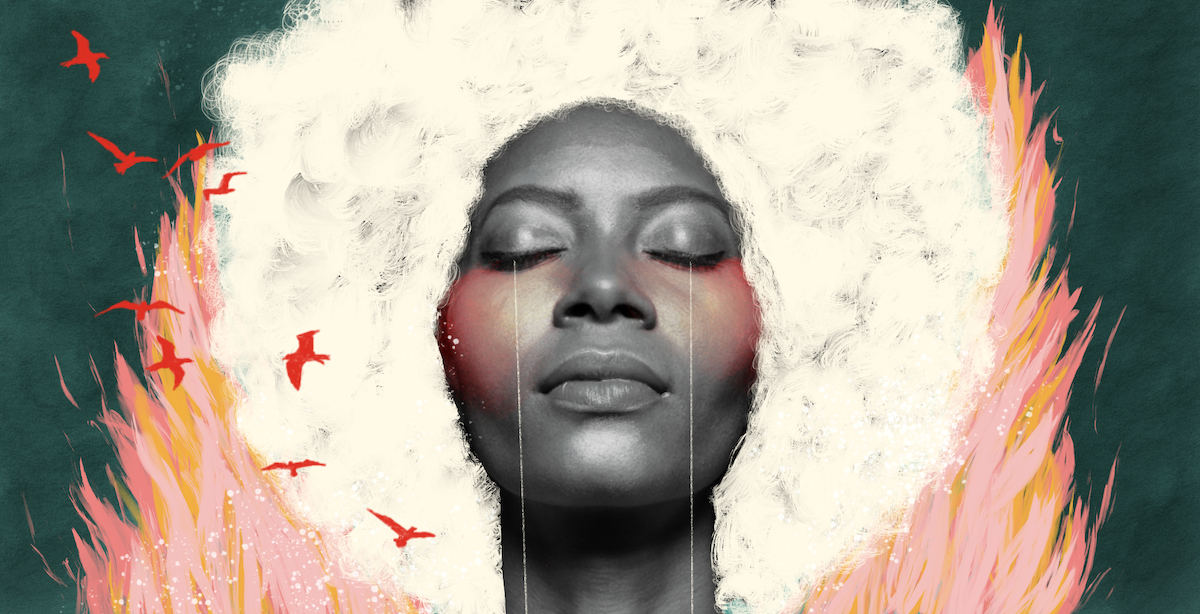It was the kind of scream that ripped into my eardrum. The kind that a mom couldn’t ignore, even if it wasn’t her baby.
This day the scream made me uncurl my feet from under my covers, place my soles—worn from six hours of teaching—onto the floor. My phone tumbled down, closing the screen on stories of George Floyd screaming, while several other humans didn’t care enough about breath or life or screams to do anything.
I smacked my bare feet onto our wooden floor so hard the sound could have alerted them I was coming. It didn’t.
I found Lia with her therapist’s arm pinned around her chest, holding her from behind as she screamed to get free. Lia’s back bucked; her teeth clenched. My jaw flung open.
“I have to do this,” her therapist said, “because she keeps kicking Monica.” Monica tugged her cornrows behind a shoulder and stacked the bingo pieces.
I pulled my daughter from under the therapist’s arm, wondering what Ms. Floyd would have done to the cops if she saw her baby pinned like that. I imagined her fingernails ripping through their police uniforms and into their flesh.
“No kicking. You say, I am angry,” her therapist said.
“I am angry,” Lia echoed.
I pushed my hips between my baby and her therapist, and moved Monica to the side of the table. “Do you need your headphones?” I asked Lia.
I put her noise cancellation headphones over her ears before she had a chance to answer. “You have to talk quietly,” I whispered to Monica. “Her ears are very powerful.”
“Okay,” she whispered back.
Her therapist straightened her red blouse as if to return to a person who hadn’t just tussled on the floor with a five-year-old, a reminder that she was an adult. She was the adult.
I stayed there, helping to model how to work together and play Word Bingo.
My soles throbbed with the guilt that I had asked for this. I had asked this therapist into our home and invited a child from her kindergarten class as a communication partner. I wanted my child to learn about talking to other people because when I pictured her growing up, I kept seeing Breonna, Tamir, Sandra, and Eric, the faces of all the Black children and adults whose pleas went unheard.
She at least needed the fighting chance to plead—a way to respond and not walk away when she couldn’t find words.
This woman and this child I brought into our home were supposed to be preparing my baby for the world, except that she was preparing her—for a world that constructed my Black daughter as the problem.
I picked my phone up from the floor and went to my car to call her supervisor. I turned the car on and listened to the engine revv.
I had learned from my past angry rants to supervisors to start with compliments. “She usually does a wonderful job. She taught Lia our phone number and our names in a week, so she can tell someone how to reach us if she gets lost.”
The air conditioner blew directly into my face, it’s once calming cold became uncomfortable.
“I just want Dana to teach her words to express her frustration,” I said, knowing that, for Black girls, explanations are not enough. Knowing the fire will burn us all down, and all we can do is watch it burn, and dream, and push, and hope that it’s the kind of fire that helps us start a new beginning.
I wish that were the day when I had torched it all, let it burn to a scorched earth of fresh beginning. But it wasn’t.
It was the day when the therapist’s supervisor said, ” What you’re talking about is what she’s supposed to be doing.”
I turned the car off, let the engine rest. The following week, I discovered that the supervisor wrote notes from our call. Remarks not to reprimand the therapist but, rather, for parent training. To teach me how to ignore Lia’s screams.
Illustration by Cassandra Orion
Thanks for reading! If you enjoy Raising Mothers, please consider making a one-time or recurring contribution to help us remain ad-free. If even a fraction of subscribers signed up to contribute $1 per month, Raising Mothers could be self-sustaining!

